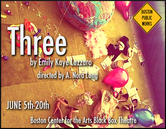
Secrets play a major role in Three.
Diane and Sam have a secret that affects their relationship through the life of the play. Jenni has a secret that could destroy the friendship we've seen evolve throughout the play. Secrets are part of the dramatic tension of Three. Consider this bit of dialogue:
DIANE - I don't want to tell you, Sam wants to keep it secret.
JENNI - I think we should tell each other secrets later, though. Because it's fun.
DIANE - I love telling secrets.
JENNI - I know you do.
DIANE - It's, like, my favorite thing.
JENNI - I know, that's why I never tell you things I don't want other people to know.
DIANE - Don't tell me your secrets! I will tell everyone.
Or:
JENNI - If I tell you something will you promise to still like me?
DIANE - No.
When audience members know secrets before characters in the play, it makes the audience complicit in the secrecy. It brings the audience into the world of the play in a very visceral way.
Playwright Emily Kaye Lazzaro said that her idea behind the secrets was that the act of telling a secret, whether it's to a friend or to a stranger, is really pleasurable and freeing. "Secrets are sort of made to be told," she said.
Which is why, in the lobby, there is a box. And Emily has asked audience members to anonymously write their secrets on a piece of paper and put them in the box. There are a few prompts to help get ideas flowing. Prompts like, "I'm too scared to have sex because of the face I might make during it" and "You didn't prepare me for how cruel the world can be."
What we weren't prepared for was the honesty and fearlessness that we found from our audience when we opened the box.
I pee in the shower.
I feel like I'm the only thing holding my family together.
I'm ashamed of how I look but want to be a confident woman.
I never acknowledge when I accidentally fart.
I wish I had slept with more of my friends.
If I sit down to eat by myself, I'll cry.
Secrets. What's your secret?
Diane and Sam have a secret that affects their relationship through the life of the play. Jenni has a secret that could destroy the friendship we've seen evolve throughout the play. Secrets are part of the dramatic tension of Three. Consider this bit of dialogue:
DIANE - I don't want to tell you, Sam wants to keep it secret.
JENNI - I think we should tell each other secrets later, though. Because it's fun.
DIANE - I love telling secrets.
JENNI - I know you do.
DIANE - It's, like, my favorite thing.
JENNI - I know, that's why I never tell you things I don't want other people to know.
DIANE - Don't tell me your secrets! I will tell everyone.
Or:
JENNI - If I tell you something will you promise to still like me?
DIANE - No.
When audience members know secrets before characters in the play, it makes the audience complicit in the secrecy. It brings the audience into the world of the play in a very visceral way.
Playwright Emily Kaye Lazzaro said that her idea behind the secrets was that the act of telling a secret, whether it's to a friend or to a stranger, is really pleasurable and freeing. "Secrets are sort of made to be told," she said.
Which is why, in the lobby, there is a box. And Emily has asked audience members to anonymously write their secrets on a piece of paper and put them in the box. There are a few prompts to help get ideas flowing. Prompts like, "I'm too scared to have sex because of the face I might make during it" and "You didn't prepare me for how cruel the world can be."
What we weren't prepared for was the honesty and fearlessness that we found from our audience when we opened the box.
I pee in the shower.
I feel like I'm the only thing holding my family together.
I'm ashamed of how I look but want to be a confident woman.
I never acknowledge when I accidentally fart.
I wish I had slept with more of my friends.
If I sit down to eat by myself, I'll cry.
Secrets. What's your secret?



